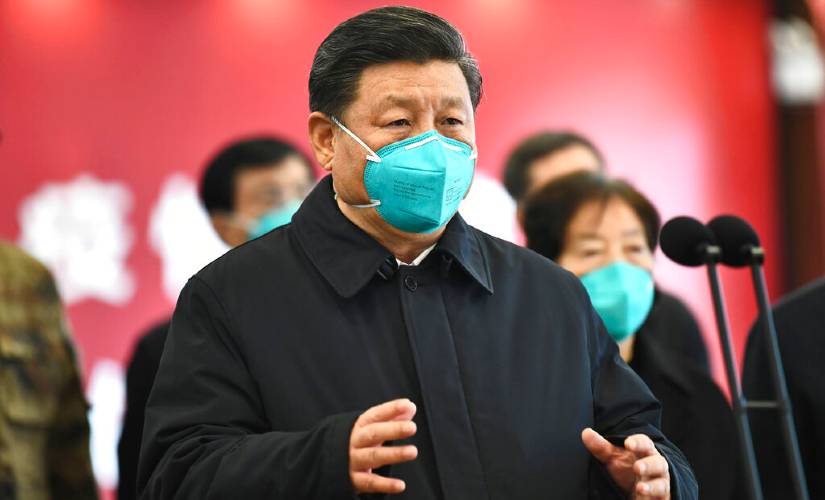Is President Xi Jinping and his government losing their grip over the Covid virus management? Epidemiologists predict at least three waves of the virus to hit China this winter, even as the count of patients and bodies pile up across the country which ended its Zero-Covid policy after strong anti-lockdown protests.
It is certain the Chinese government was caught under-prepared as it decided to withdraw the Zero-Covid policy abruptly following the people’s unrest. Western media reports say hospitals in China are facing the twin problems of running out of beds because of long lines of patients and medical staff getting infected, slowing down the hospital work. Such is the demand for medicine that pharmacies are running out of stocks with scant possibility of replenishment.
Agencies quoted experts forecasting as many as a million-odd deaths in the coming months. Experts warn that the country is poorly prepared for such a drastic exit, having fallen short on bolstering the elderly vaccination rate, upping surge and intensive care capacity in hospitals, and stockpiling antiviral medications.
Under the current conditions, a nationwide reopening could result in up to 684 deaths per million people, according to the projections by three professors at the University of Hong Kong. Given China’s population of 1.4 billion people, that would amount to 964,400 deaths.
The surge of infections would “likely overload many local health systems across the country,” said the research paper, released last week on the Medrxiv preprint server and which has yet to undergo peer review.
Simultaneously lifting restrictions in all provinces would lead to hospitalization demands 1.5 to 2.5 times of surge hospital capacity, according to the study. But this worst case scenario could be avoided if China rapidly rolls out booster shots and antiviral drugs. With fourth-dose vaccination coverage of 85% and antiviral coverage of 60%, the death toll can be reduced by 26% to 35%, according to the study, which is funded partly by the Chinese Center for Disease Control and Prevention (CDC) and the Hong Kong government.
Though officially the Chinese government is mum on the number of deaths – under 10 deaths admitted officially so far — Chinese authorities have warned of successive waves of Covid infections over the coming months, as cases continue to surge after the lifting of restrictions earlier this month. Across major cities people appear to be staying inside, either with the virus or in fear of contracting it, but authorities have pushed on with the reopening.
Speaking at a conference in Beijing, Wu Zunyou, the chief epidemiologist at the Chinese Centre for Disease Control and Prevention, said “the current outbreak would peak this winter and run in three waves for about three months”, according to a state media report of his speech.
Wu said the “first wave would run from now until mid-January. A second wave would likely follow soon after, triggered by the mass travel of hundreds of millions of people across the country for the Lunar New Year starting on 21 January”.
He predicted a “third wave from late February to mid-March after people returned to work from the holidays”. The wave is expected to be triggered by the mass travel ahead of the Lunar New Year holiday, which falls on January 21. Every year, hundreds of millions of people who have left their hometowns to build a life in China’s fast growing cities pour into trains, buses and planes to see their family – a weeks-long travel rush known as the largest annual human migration on Earth.
According to media reports, residents are reporting countless cases of Covid around them, despite the official count being around jut 2,000 a day. Last week the national health commission conceded it was “impossible” to keep track of asymptomatic infections, and it would no longer be counting them. The removal of mass testing and reduction in mandatory tests mean few people are getting tested.
City streets appeared quiet over the weekend in Beijing and Shanghai, despite further liberalisation of restrictions, including the cancellation of 126 travel and testing measures on key industries, according to state media.
The questions are beginning asked of the Xi Jinping government’s effectiveness in preparing for the virus attack. What did the government when the Zero-Covid policy was in force other than locking people in homes and conducting mass testing? How come the virus is still so viral if people’s movement was curtailed all these months?
The second question is about the spread of the virus to the vast rural areas from the cities and towns. Nobody knows the real situation in the rural areas in face of blanket ban on information leaking out. The state of medical infrastructure over there is also not known.
The third question is about the availability of adequate number of effective vaccine doses. China’s own vaccines have not proven to be as effective as the Indian or the western ones.
Overseas-developed vaccines are unavailable in mainland China, which has relied on inactivated shots by Sinopharm, Sinovac’s Coronavac and other domestically developed options. It has yet to introduce its own version of an mRNA vaccine, and questions remain over their efficacy compared with foreign-made mRNA counterparts, said Kelly Lei, a doctor in the southern Chinese city of Shenzhen.
Scientists are quoted by agencies as saying: “At least a half of doctors and educated people wanted to get the mRNA ones and refused to get the Chinese ones. After a while, people see no hope and also they are kind of forced to get the Chinese ones, so they had to accept it.”

Leave a Reply